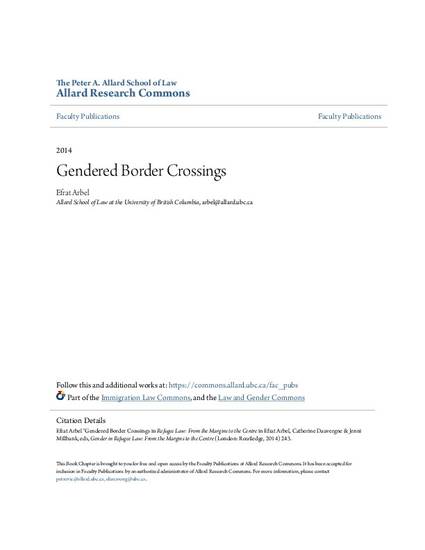
Contribution to Book
Gendered Border Crossings.pdf
Gender in Refugee Law: from the Margins to the Centre
(2014)
Abstract
Nine years after the implementation of the Canada-US Safe Third Country Agreement (STCA), this chapter examines the STCA while asking the question: what about gender? How have initial concerns about the STCA’s adverse gender impact mapped onto the current, much-altered landscape of Canadian refugee law? The chapter revisits findings made in Bordering on Failure, a recent report I co-authored about the STCA, in an effort to read gender into its absence. I begin by charting an overview of the STCA’s operation and effect to provide context for discussion. I then revisit the central findings made in Bordering on Failure, paying attention to the question of gender. I argue that while the findings made in Bordering on Failure suggests the STCA may be impacting women in adverse ways, these effects are difficult to identify with any precision. I further argue that in is in this respect that the gendered impact of the STCA is most acutely felt: its gendered contours are increasingly disappearing from view. The dearth of information about the STCA impact on women raises a serious possibility that the new fault lines of Canadian refugee law and policy will be charted in ways that are inattentive to the specific protection needs of women, leaving many gender issues unrecognized, and others out of sight.
Keywords
- Refugee Law,
- Gender,
- Canadian Border Law and Policy,
- Safe Third Country Agreement
Disciplines
Publication Date
2014
Editor
Efrat Arbel, Catherine Dauvergne, and Jenni Millbank
Publisher
Routledge
Citation Information
Efrat Arbel. "Gendered Border Crossings.pdf" Gender in Refugee Law: from the Margins to the Centre (2014) p. 243 - 263 Available at: http://works.bepress.com/efrat-arbel/8/
